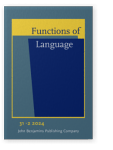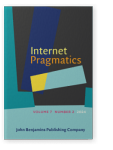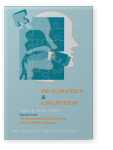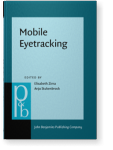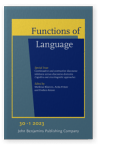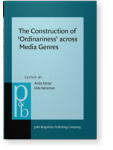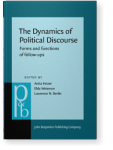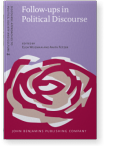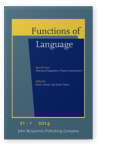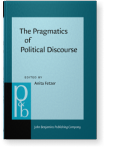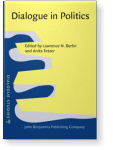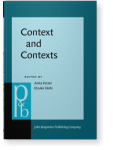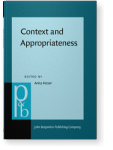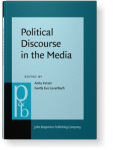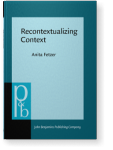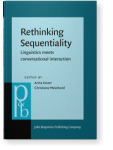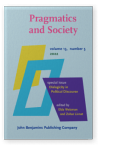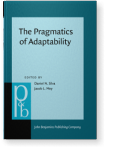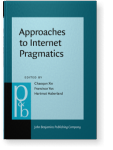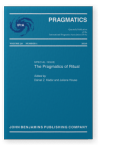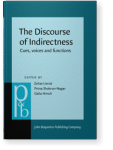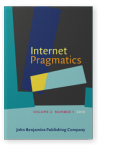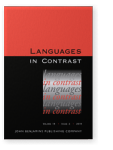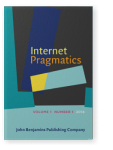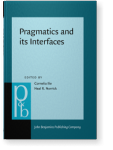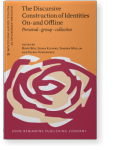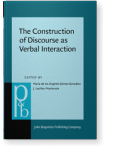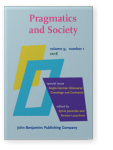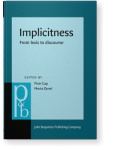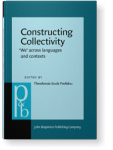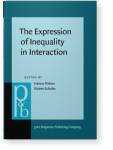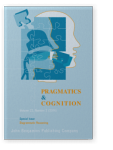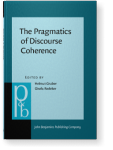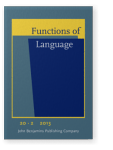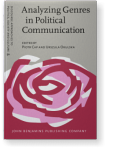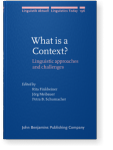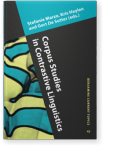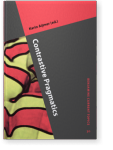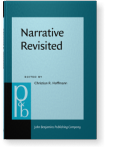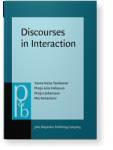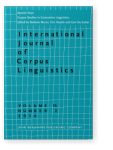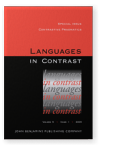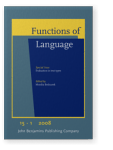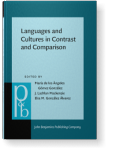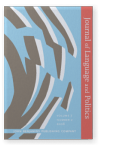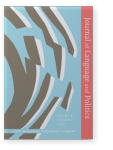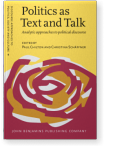Anita Fetzer
List of John Benjamins publications for which Anita Fetzer plays a role.
Journals
ISSN 0929-0907 | E-ISSN 1569-9943
Book series
Continuative and contrastive discourse relations across discourse domains: Cognitive and cross-linguistic approaches
Edited by Matthias Klumm, Anita Fetzer and Evelien Keizer
Special issue of Functions of Language 30:1 (2023) v, 135 pp.
Subjects Corpus linguistics | Discourse studies | Functional linguistics | Pragmatics | Theoretical linguistics
The Construction of ‘Ordinariness’ across Media Genres
Edited by Anita Fetzer and Elda Weizman
[Pragmatics & Beyond New Series, 307] 2019. vi, 297 pp.
Subjects Communication Studies | Discourse studies | Pragmatics
The Dynamics of Political Discourse: Forms and functions of follow-ups
Edited by Anita Fetzer, Elda Weizman and Lawrence N. Berlin
[Pragmatics & Beyond New Series, 259] 2015. vi, 278 pp.
Subjects Communication Studies | Discourse studies | Pragmatics
Follow-ups in Political Discourse: Explorations across contexts and discourse domains
Edited by Elda Weizman and Anita Fetzer
[Discourse Approaches to Politics, Society and Culture, 60] 2015. xix, 265 pp.
Subjects Discourse studies | Pragmatics
Discourse linguistics: Theory and practice
Edited by Karin Aijmer and Anita Fetzer
Special issue of Functions of Language 21:1 (2014) iii, 137 pp.
Subjects Functional linguistics | Pragmatics | Theoretical linguistics
The Pragmatics of Political Discourse: Explorations across cultures
Edited by Anita Fetzer
[Pragmatics & Beyond New Series, 228] 2013. vi, 246 pp.
Subjects Discourse studies | Pragmatics
Dialogue in Politics
Edited by Lawrence N. Berlin and Anita Fetzer
[Dialogue Studies, 18] 2012. vii, 313 pp.
Subjects Communication Studies | Dialogue studies | Discourse studies | Pragmatics
Context and Contexts: Parts meet whole?
Edited by Anita Fetzer and Etsuko Oishi
[Pragmatics & Beyond New Series, 209] 2011. vii, 239 pp.
Subjects Discourse studies | Pragmatics
Context and Appropriateness: Micro meets macro
Edited by Anita Fetzer
[Pragmatics & Beyond New Series, 162] 2007. vi, 265 pp.
Subjects Discourse studies | Pragmatics | Sociolinguistics and Dialectology
Political Discourse in the Media: Cross-cultural perspectives
Edited by Anita Fetzer and Gerda Eva Lauerbach
[Pragmatics & Beyond New Series, 160] 2007. viii, 379 pp.
Subjects Communication Studies | Discourse studies | Pragmatics
Recontextualizing Context: Grammaticality meets appropriateness
Anita Fetzer
[Pragmatics & Beyond New Series, 121] 2004. x, 272 pp.
Subjects Discourse studies | English linguistics | Germanic linguistics | Pragmatics | Syntax
Rethinking Sequentiality: Linguistics meets conversational interaction
Edited by Anita Fetzer and Christiane Meierkord
[Pragmatics & Beyond New Series, 103] 2002. vi, 300 pp.
Subjects Cognitive linguistics | Discourse studies | Pragmatics
2024 ‘What we found is’: Pseudo-clefts, cataphora, projection and cohesive chains Functions of Language 31:2, pp. 142–165 | Article
This paper examines two variants of the pseudo-cleft construction which display a WHAT-NP-VP-be pattern with the VP realised with cognitive verbs and the proform do in the context of spoken British English dyadic and multi-party BBC podcasts. It is based on the premise that the construction’s… read more
2024 Being sensible is now a radical concept I LOVE that quote haha: Quotations in political speeches and user comments Internet Pragmatics: Online-First Articles | Article
This paper examines how the communicative act of quotation may contribute to ordinary users’ discussion of politics through user comments following up on government- and opposition-party speeches during a pre-election and a non-election period in Britain. It analyses the linguistic formatting of… read more
2024 Quotation headlines in the printed British quality press: (Re-)contextualisation meets entextualisation Pragmatics: Online-First Articles | Article
News discourse comes along with the presumption of newsworthiness, and this also holds for one of its constitutive parts: headlines. This paper adopts a discourse-pragmatic perspective to the formatting and discursive function of quotation headlines in the printed British quality press. It… read more
2023 The linguistic realization of continuative discourse relations in English discourse: A context-based analysis across narrative and argumentative genres Continuative and contrastive discourse relations across discourse domains: Cognitive and cross-linguistic approaches, Klumm, Matthias, Anita Fetzer and Evelien Keizer (eds.), pp. 16–40 | Article
This paper examines the linguistic realization of continuative discourse relations in British English written discourse comparing narrative and argumentative dyadically edited texts. The data comprise 18 co-edited texts and metadata documenting the editing process (keystroke logs and transcripts… read more
2023 Continuative and contrastive discourse relations across discourse domains: Cognitive and cross-linguistic approaches Continuative and contrastive discourse relations across discourse domains: Cognitive and cross-linguistic approaches, Klumm, Matthias, Anita Fetzer and Evelien Keizer (eds.), pp. 4–15 | Introduction
2022 Doing things with discourse in the mediated political arena: Participation and pluralism of discursive action Dialogicity in Political Discourse, Weizman, Elda and Zohar Livnat (eds.), pp. 769–792 | Article
This paper examines the contextual constraints and requirements of discursive action in question-answer-sequences based discourse genres (interviews, Prime Minister’s Questions, People’s Prime Minister’s Questions) in mediated political discourse. It considers the multilayeredness of… read more
2021 Chapter 7. Quotation, meta-data and transparency of sources in mediated political discourse The Pragmatics of Adaptability, Silva, Daniel N. and Jacob L. Mey (eds.), pp. 143–170 | Chapter
Quotation has been defined as metarepresentation, metarepresenting not only the pragmatic force and content of a conversational contribution, but also its source and contextual coordinates. It thus displays a higher degree of explicitness than does the original contribution, as is reflected in… read more
2021 Chapter 2. Computer-mediated discourse in context: Pluralism of communicative action and discourse common ground Approaches to Internet Pragmatics: Theory and practice, Xie, Chaoqun, Francisco Yus and Hartmut Haberland (eds.), pp. 47–74 | Chapter
This paper examines the particularisation of the pragmatic universals of contextualisation, indexicality of communicative action and implicature in computer-mediated discourse. It adopts a discourse-pragmatic perspective to account for the interdependencies between the contextual constraints and… read more
2020 Calling Mr Speaker ‘Mr Speaker’: The strategic use of ritual references to the Speaker of the UK House of Commons The Pragmatics of Ritual, Kádár, Dániel Z. and Juliane House (eds.), pp. 64–87 | Article
Prime Minister’s Questions (PMQs) in the UK House of Commons is a ritual event, governed by a cluster of conventions. Members of Parliament (MPs) must address their remarks to the Prime Minister (PM) through the medium of the Speaker of the House, who is responsible for maintaining order during… read more
2020 “The hon. Gentleman says this is rubbish; it is absolutely true”: The strategic use of references to truth in Prime Minister’s Questions The Discourse of Indirectness: Cues, voices and functions, Livnat, Zohar, Pnina Shukrun-Nagar and Galia Hirsch (eds.), pp. 203–230 | Chapter
This chapter reports on an analysis of references to truth and compares their discursive value with references to fact and to reality as argumentative and rhetorical resources in the context of Prime Minister’s Questions. Truth is assigned a dual status in the analysis: it is a fundamental premise… read more
2019 Some food for thought on the theory and practice of internet pragmatics Internet Pragmatics 2:1, pp. 34–40 | Commentary
2019 Discourse relations across genres and contexts: A contrastive analysis of English and German discourse Languages in Contrast 19:2, pp. 205–231 | Article
This paper presents an analysis of the linguistic realization of discourse relations across and within English and German discourse, comparing the genres of newspaper editorial and personal narrative. It concentrates on Continuation, Narration and Contrast, and Elaboration, Explanation and… read more
2019 Quoting ordinary people in Prime Minister’s Questions1 The Construction of ‘Ordinariness’ across Media Genres, Fetzer, Anita and Elda Weizman (eds.), pp. 73–101 | Chapter
Prime Minister’s Questions is the central British parliamentary institution. Every week Members of Parliament have the opportunity to pose questions to the Prime Minister, frequently utilising quotations from various sources, e.g. allies from the quoter’s political party, political opponents,… read more
2019 Evidentiality and stance in YouTube comments on smartphone reviews Internet Pragmatics 2:1, pp. 112–135 | Article
Online participatory environments have become saturated spaces in terms of the opportunities that they offer for the display of different viewpoints and ideologies. YouTube, as a popular video-sharing and networking site, constitutes a new media space that invites both individual and… read more
2019 Introduction The Construction of ‘Ordinariness’ across Media Genres, Fetzer, Anita and Elda Weizman (eds.), pp. 1–17 | Chapter
2018 “Our Chief Political Editor reads between the lines of the Chancellor’s Budget speech”: The strategic exploitation of conversational implicature in mediated political discourse Internet Pragmatics 1:1, pp. 29–54 | Article
This paper examines the multilayeredness of computer-mediated political discourse, focussing on the interdependencies between the contextual constraints and requirements of the medium on the one hand, and contextualisation, indexicality of communicative action and conversational implicature on… read more
2018 Discourse pragmatics: Communicative action meets discourse analysis Pragmatics and its Interfaces, Ilie, Cornelia and Neal R. Norrick (eds.), pp. 33–57 | Chapter
The multifaceted and multi-layered phenomenon of discourse has been examined in diverse research paradigms, concentrating on text as the object of investigation, on the connectedness between text and society, and on the representation of discourse. All approaches share the premise that discourse… read more
2018 “And you know, Jeremy, my father came from a very poor background indeed”: Collective identities and the private-public interface in political discourse The Discursive Construction of Identities On- and Offline: Personal - group - collective, Bös, Birte, Sonja Kleinke, Sandra Mollin and Nuria Hernández (eds.), pp. 227–248 | Chapter
This chapter examines the discursive construction of identity in political discourse and considers collective identities as the default in that context. It utilises an integrated approach informed by interactional sociolinguistics and discourse pragmatics. Departing from the premise that… read more
2018 The encoding and signalling of discourse relations in argumentative discourse: Evidence across production formats The Construction of Discourse as Verbal Interaction, Gómez González, María de los Ángeles and J. Lachlan Mackenzie (eds.), pp. 13–44 | Chapter
This chapter examines the role of production format in the linguistic realization of discourse relations in the argumentative discourse genre of commentary, distinguishing between implicitly realized discourse relations, encoded in coherence strands and lexical coherence, and overtly realized… read more
2018 “Well would you believe it, I have failed the exam again”: Discourse relations in English and German personal narratives Anglo-German Discourse Crossings and Contrasts, Jaworska, Sylvia and Torsten Leuschner (eds.), pp. 26–51 | Article
This paper compares the linguistic realization of coordinating and subordinating discourse relations in English and German short personal narratives, paying particular attention to the context-dependence of (1) their overt marking with discourse connectives, and (2) their adjacent and… read more
2017 Chapter 11. The dynamics of discourse: Quantity meets quality Implicitness: From lexis to discourse, Cap, Piotr and Marta Dynel (eds.), pp. 235–258 | Chapter
This chapter argues for a dynamic perspective on discourse, delimiting discourse from context on the one hand, and from arbitrarily concatenated discourse units on the other. Addressing the question of granularity in an explicit manner, it argues for a relational conception of the constitutive… read more
2015 Introduction The Dynamics of Political Discourse: Forms and functions of follow-ups, Fetzer, Anita, Elda Weizman and Lawrence N. Berlin (eds.), pp. 1–14 | Article
2015 ‘When you came into office you said that your government would be different’: Forms and functions of quotations in mediated political discourse The Dynamics of Political Discourse: Forms and functions of follow-ups, Fetzer, Anita, Elda Weizman and Lawrence N. Berlin (eds.), pp. 245–273 | Article
The goal of this chapter is to analyse the forms and communicative functions of quotations as follow-ups in mediated political discourse where they are used strategically to achieve the following goals: (1) intensify the force of an argument, (2) demonstrate ideological coherence or non-coherence,… read more
2015 Following up across contexts and discourse domains: Introduction Follow-ups in Political Discourse: Explorations across contexts and discourse domains, Weizman, Elda and Anita Fetzer (eds.), pp. ix–xx | Article
2014 Discourse linguistics: Theory and practice Discourse linguistics: Theory and practice, Aijmer, Karin and Anita Fetzer (eds.), pp. 1–5 | Article
2014 “Judge us on what we do”: The strategic use of collective we in British
political discourse Constructing Collectivity: 'We' across languages and contexts, Pavlidou, Theodossia-Soula (ed.), pp. 331–350 | Article
This chapter examines the referential domain, communicative function and perlocutionary effect of the first person plural pronoun we in dialogic and monologic British political discourse. Its methodological framework is an integrated one, combining interactional sociolinguistics, in particular… read more
2014 We and I, and you and them: People, power and solidarity The Expression of Inequality in Interaction: Power, dominance, and status, Pishwa, Hanna and Rainer Schulze (eds.), pp. 213–238 | Article
This chapter examines the referential domain, communicative function and perlocutionary effect of the personal plural pronouns I and we, and you and them in political discourse, considering in particular their role in doing dominance and doing collectivity. Its methodological framework is an… read more
2014 I think, I mean and I believe in political discourse: Collocates, functions and distribution Discourse linguistics: Theory and practice, Aijmer, Karin and Anita Fetzer (eds.), pp. 67–94 | Article
This article examines the distribution, collocates and function of the first-person-singular cognitive-verb-based syntagmatic configurations I think, I mean and I believe in argumentative political discourse, considering their status as parenthetical construction and pragmatic marker in two sets of… read more
2014 Review of Kecskes (2014): Intercultural Pragmatics Diagrammatic Reasoning, Fusaroli, Riccardo and Kristian Tylén (eds.), pp. 284–289 | Review
2014 The coding of discourse relations in English and German argumentative discourse The Pragmatics of Discourse Coherence: Theories and applications, Gruber, Helmut and Gisela Redeker (eds.), pp. 87–119 | Article
This chapter examines contrastively the overt and non-overt coding of discourse
relations in British English and German editorials. Particular attention is given
to the linguistic coding of discourse relations between adjacently and non-adjacently
positioned discourse units, and to the question… read more
2013 The multilayered and multifaceted nature of political discourse The Pragmatics of Political Discourse: Explorations across cultures, Fetzer, Anita (ed.), pp. 1–18 | Article
2013 Chapter 2. Political interviews in context Analyzing Genres in Political Communication: Theory and practice, Cap, Piotr and Urszula Okulska (eds.), pp. 73–99 | Article
The genre of the broadcast political interview is examined from a compositional methodological approach, drawing on ethnomethodological conversation analysis, critical discourse analysis, sociopragmatics, social psychology and media studies. A distinction is proposed between the default and… read more
2012 Dialogue in politics Dialogue in Politics, Berlin, Lawrence N. and Anita Fetzer (eds.), pp. 3–18 | Article
2012 Contexts in interaction: Relating pragmatic wastebaskets What is a Context?: Linguistic approaches and challenges, Finkbeiner, Rita, Jörg Meibauer and Petra B. Schumacher (eds.), pp. 105–128 | Article
The concept of context has undergone some fundamental rethinking in the scientific community, where it is no longer seen as an analytic prime. Rather than being solely looked upon as an external constraint on linguistic performance, context has been analyzed as a product of language use, as… read more
2012 Cognitive verbs in context: A contrastive analysis of English and French argumentative discourse Corpus Studies in Contrastive Linguistics, Marzo, Stefania, Kris Heylen and Gert de Sutter (eds.), pp. 89–115 | Article
This paper examines the frequency, distribution and function of 1st person self-references with the cognitive verbs think and believe, and penser and croire in British English and French argumentative discourse comprising 29 British political interviews (178,712 words) and 26 French political… read more
2011 “Here is the difference, here is the passion, here is the chance to be part of great change”: Strategic context importation in political discourse Context and Contexts: Parts meet whole?, Fetzer, Anita and Etsuko Oishi (eds.), pp. 115–146 | Article
This contribution examines the strategic importation of context through conventional means focusing on the communicative function of the indexical deictic form here and its counterpart there in the dialogic genre of political interview and in the monologic genre of political speech. It is based on… read more
2011 Challenges in contrast: A function-to-form approach Contrastive Pragmatics, Aijmer, Karin (ed.), pp. 73–96 | Article
Challenges express the speaker’s intention not to comply with a proposition, force or presupposition communicated in and through a prior conversational contribution. This may be a directly adjacent contribution, some less directly adjacent contribution, or a conversational contribution uttered in… read more
2011 Introduction Context and Contexts: Parts meet whole?, Fetzer, Anita and Etsuko Oishi (eds.), pp. 1–8 | Article
2010 Small stories in political discourse: The public self goes private Narrative Revisited: Telling a story in the age of new media, Hoffmann, Christian R. (ed.), pp. 163–184 | Article
This contribution examines the form and function of small stories in monologic and dialogic political discourse. It focuses on the interface between private and public spheres of life, investigating the traditional conception of politics as public-domain anchored and that of a small story as set in… read more
2010 Contexts in context: Micro meets macro Discourses in Interaction, Tanskanen, Sanna-Kaisa, Marja-Liisa Helasvuo, Marjut Johansson and Mia Raitaniemi (eds.), pp. 13–32 | Article
Adopting an integrated approach, the contribution demonstrates that context can no longer be seen as an analytic prime. Rather than being looked upon as an external constraint on linguistic performance, it is analyzed as a product of language use, as interactionally constructed and as negotiated.… read more
2010 Cognitive verbs in context: A contrastive analysis of English and French argumentative discourse Corpus Studies in Contrastive Linguistics, Marzo, Stefania, Kris Heylen and Gert de Sutter (eds.), pp. 240–266 | Article
This paper examines the frequency, distribution and function of 1st person self-references with the cognitive verbs think and believe, and penser and croire in British English and French argumentative discourse comprising 29 British political interviews (178,712 words) and 26 French political… read more
2009 Challenges in contrast: A function-to-form approach Contrastive Pragmatics, Aijmer, Karin (ed.), pp. 73–97 | Article
Challenges express the speaker’s intention not to comply with a proposition, force or presupposition communicated in and through a prior conversational contribution. This may be a directly adjacent contribution, some less directly adjacent contribution, or a conversational contribution uttered in… read more
2008 The expression of non-alignment in British and German political interviews: Preferred and dispreferred variants Evaluation in text types, Bednarek, Monika (ed.), pp. 35–63 | Article
Political interviews are defined as question- and answer sequences in which interviewers and interviewees negotiate validity claims. Looked upon from an interpersonal angle, the interviewer sets up a position and requests the interviewee to ratify their claim by expressing alignment or… read more
2008 Theme zones in contrast: An analysis of their linguistic realization in the communicative act of a non-acceptance Languages and Cultures in Contrast and Comparison, Gómez González, María de los Ángeles, J. Lachlan Mackenzie and Elsa M. González Álvarez (eds.), pp. 3–31 | Article
This contribution examines the form and function of theme zones in a sociopragmatic framework supplemented by functional grammar comparing British English and German political discourse. In the British data, multiple themes are the unmarked variant. They signify the pragmatic force of incongruity… read more
2008 ‘Well, I answer it by simply inviting you to look at the evidence’: The strategic use of pronouns in political interviews Journal of Language and Politics 7:2, pp. 271–289 | Article
In the discourse of political interviews, references to participants can be expressed explicitly by proper nouns and forms of address, and they can be expressed implicitly by personal pronouns and other indexical expressions. The meaning of personal pronouns is context-dependent and retrievable… read more
2007 Context, contexts and appropriateness Context and Appropriateness: Micro meets macro, Fetzer, Anita (ed.), pp. 3–27 | Article
2007 If I may say so: Indexing appropriateness in dialogue Context and Appropriateness: Micro meets macro, Fetzer, Anita (ed.), pp. 115–145 | Article
This contribution examines those contexts in which a contribution is assigned the status of not such as is required (Grice 1975). The first part analyses the theoretical construct of appropriateness in an integrated framework based on Habermas’s theory of communicative action, Gice’s logic and… read more
2007 Challenges in political interviews: An intercultural analysis Political Discourse in the Media: Cross-cultural perspectives, Fetzer, Anita and Gerda Eva Lauerbach (eds.), pp. 163–195 | Article
2007 ‘I’ll tell you what the truth is’: The interactional organization of confiding in political interviews Journal of Language and Politics 6:2, pp. 147–177 | Article
The goal of this article is to examine the context-dependent nature of acts of confiding in political interviews and to identify its genre-specific constraints and requirements. It looks at their distribution in British and French political interviews with regard to form, function and possible… read more
2007 Political discourse in the media: Cross-cultural perspectives Political Discourse in the Media: Cross-cultural perspectives, Fetzer, Anita and Gerda Eva Lauerbach (eds.), pp. 3–28 | Article
2002 Communicative intentions in context Rethinking Sequentiality: Linguistics meets conversational interaction, Fetzer, Anita and Christiane Meierkord (eds.), pp. 37–69 | Article
2002 6. ‘Put bluntly, you have something of a credibility problem’: Sincerity and credibility in political interviews Politics as Text and Talk: Analytic approaches to political discourse, Chilton, Paul and Christina Schäffner (eds.), pp. 173–201 | Article
2002 Introduction Rethinking Sequentiality: Linguistics meets conversational interaction, Fetzer, Anita and Christiane Meierkord (eds.), pp. 1–33 | Article
